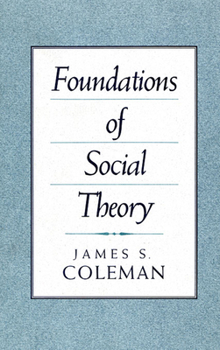Foundations of Social Theory
Combining principles of individual rational choice with a sociological conception of collective action, James Coleman recasts social theory in a bold new way. The result is a landmark in sociological theory, capable of describing both stability and change in social systems.
This book provides for the first time a sound theoretical foundation for linking the behavior of individuals to organizational behavior and then to society as a whole. The power of the theory is especially apparent when Coleman analyzes corporate actors, such as large corporations and trade unions. He examines the creation of these institutions, collective decision making, and the processes through which authority is revoked in revolts and revolutions.
Coleman discusses the problems of holding institutions responsible for their actions as well as their incompatibility with the family. He also provides a simple mathematical analysis corresponding to and carrying further the verbal formulations of the theory. Finally, he generates research techniques that will permit quantitative testing of the theory.
From a simple, unified conceptual structure Coleman derives, through elegant chains of reasoning, an encompassing theory of society. It promises to be the most important contribution to social theory since the publication of Talcott Parsons' Structure of Social Action in 1936.
Customer Reviews
Rated 5 starsEssential
Coleman believed that sociological theory must justify itself. It must be testable and have implications for society. Coleman was also the biggest proponent of rational choice theory in sociology. This perspective has limitations (generally acknowledged by Coleman and exaggerated by most sociologists). This book is for serious students of any social science.
0Report
Rated 4 starsA gargantuan synthetic effort
Coleman's book is one of the most ambitious sustained attempts to theorize the social world from a single perspective -- and one which, unlike systems theories (e.g., Parsons, Luhmann) has clear predictive consequences. Of course, the book is just as interesting for where rational choice theory breaks down (e.g., with regard to obligations to family and extreme religious groups, and when it comes to preference formation) as...
0Report
Rated 4 starsChallenging
It was not easy to read through this. But, for those who wanna try something other than usual in sociology, I think this book will do. Don't you think the truth about our society is still out there? We have come here and it's too far away from the truth. ..and I think sociology is left land which will be fertile in some centuries. I think this book started first for searching another method to the gold, truth. Not just...
0Report















